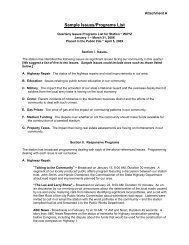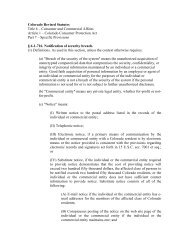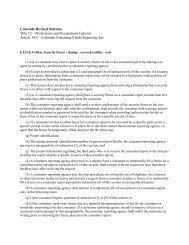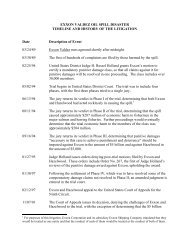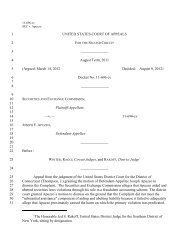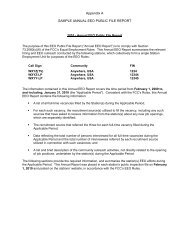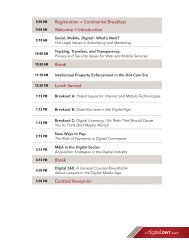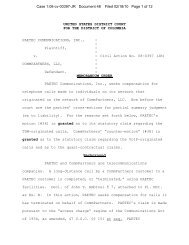QUANTA SERVICES INC, QUANTA SERVICES MANAGEMENT ...
QUANTA SERVICES INC, QUANTA SERVICES MANAGEMENT ...
QUANTA SERVICES INC, QUANTA SERVICES MANAGEMENT ...
Create successful ePaper yourself
Turn your PDF publications into a flip-book with our unique Google optimized e-Paper software.
Critical Accounting Policies<br />
The discussion and analysis of our financial condition and results of operations are based on our<br />
consolidated financial statements, which have been prepared in accordance with accounting principles generally<br />
accepted in the United States. The preparation of these consolidated financial statements requires us to make<br />
estimates and assumptions that affect the reported amounts of assets and liabilities, disclosures of contingent<br />
assets and liabilities known to exist as of the date the consolidated financial statements are published and the<br />
reported amounts of revenues and expenses recognized during the periods presented. We review all significant<br />
estimates affecting our consolidated financial statements on a recurring basis and record the effect of any<br />
necessary adjustments prior to their publication. Judgments and estimates are based on our beliefs and<br />
assumptions derived from information available at the time such judgments and estimates are made.<br />
Uncertainties with respect to such estimates and assumptions are inherent in the preparation of financial<br />
statements. There can be no assurance that actual results will not differ from those estimates. Management has<br />
reviewed its development and selection of critical accounting estimates with the audit committee of our Board of<br />
Directors. We believe the following accounting policies affect our more significant judgments and estimates used<br />
in the preparation of our consolidated financial statements:<br />
Revenue Recognition<br />
Infrastructure Services — Through our Electric Power Infrastructure Services, Natural Gas and Pipeline<br />
Infrastructure Services and Telecommunications Infrastructure Services segments, we design, install and<br />
maintain networks for customers in the electric power, natural gas, oil and telecommunications industries. These<br />
services may be provided pursuant to master service agreements, repair and maintenance contracts and fixed<br />
price and non-fixed price installation contracts. Pricing under these contracts may be competitive unit price, costplus/hourly<br />
(or time and materials basis) or fixed price (or lump sum basis), and the final terms and prices of<br />
these contracts are frequently negotiated with the customer. Under unit-based contracts, the utilization of an<br />
output-based measurement is appropriate for revenue recognition. Under these contracts, we recognize revenue<br />
as units are completed based on pricing established between us and the customer for each unit of delivery, which<br />
best reflects the pattern in which the obligation to the customer is fulfilled. Under our cost-plus/hourly and time<br />
and materials type contracts, we recognize revenue on an input basis, as labor hours are incurred and services are<br />
performed.<br />
Revenues from fixed price contracts are recognized using the percentage-of-completion method, measured<br />
by the percentage of costs incurred to date to total estimated costs for each contract. These contracts provide for a<br />
fixed amount of revenues for the entire project. Such contracts provide that the customer accept completion of<br />
progress to date and compensate us for services rendered, which may be measured in terms of units installed,<br />
hours expended or some other measure of progress. Contract costs include all direct materials, labor and<br />
subcontract costs and those indirect costs related to contract performance, such as indirect labor, supplies, tools,<br />
repairs and depreciation costs. Much of the materials associated with our work are owner-furnished and are<br />
therefore not included in contract revenues and costs. The cost estimation process is based on the professional<br />
knowledge and experience of our engineers, project managers and financial professionals. Changes in job<br />
performance, job conditions and final contract settlements are factors that influence management’s assessment of<br />
total contract value and the total estimated costs to complete those contracts and therefore, our profit recognition.<br />
Changes in these factors may result in revisions to costs and income, and their effects are recognized in the<br />
period in which the revisions are determined. Provisions for losses on uncompleted contracts are made in the<br />
period in which such losses are determined to be probable and the amount can be reasonably estimated. If actual<br />
results significantly differ from our estimates used for revenue recognition and claim assessments, our financial<br />
condition and results of operations could be materially impacted.<br />
We may incur costs subject to change orders, whether approved or unapproved by the customer, and/or<br />
claims related to certain contracts. We determine the probability that such costs will be recovered based upon<br />
evidence such as past practices with the customer, specific discussions or preliminary negotiations with the<br />
customer or verbal approvals. We treat items as a cost of contract performance in the period incurred if it is not<br />
57




